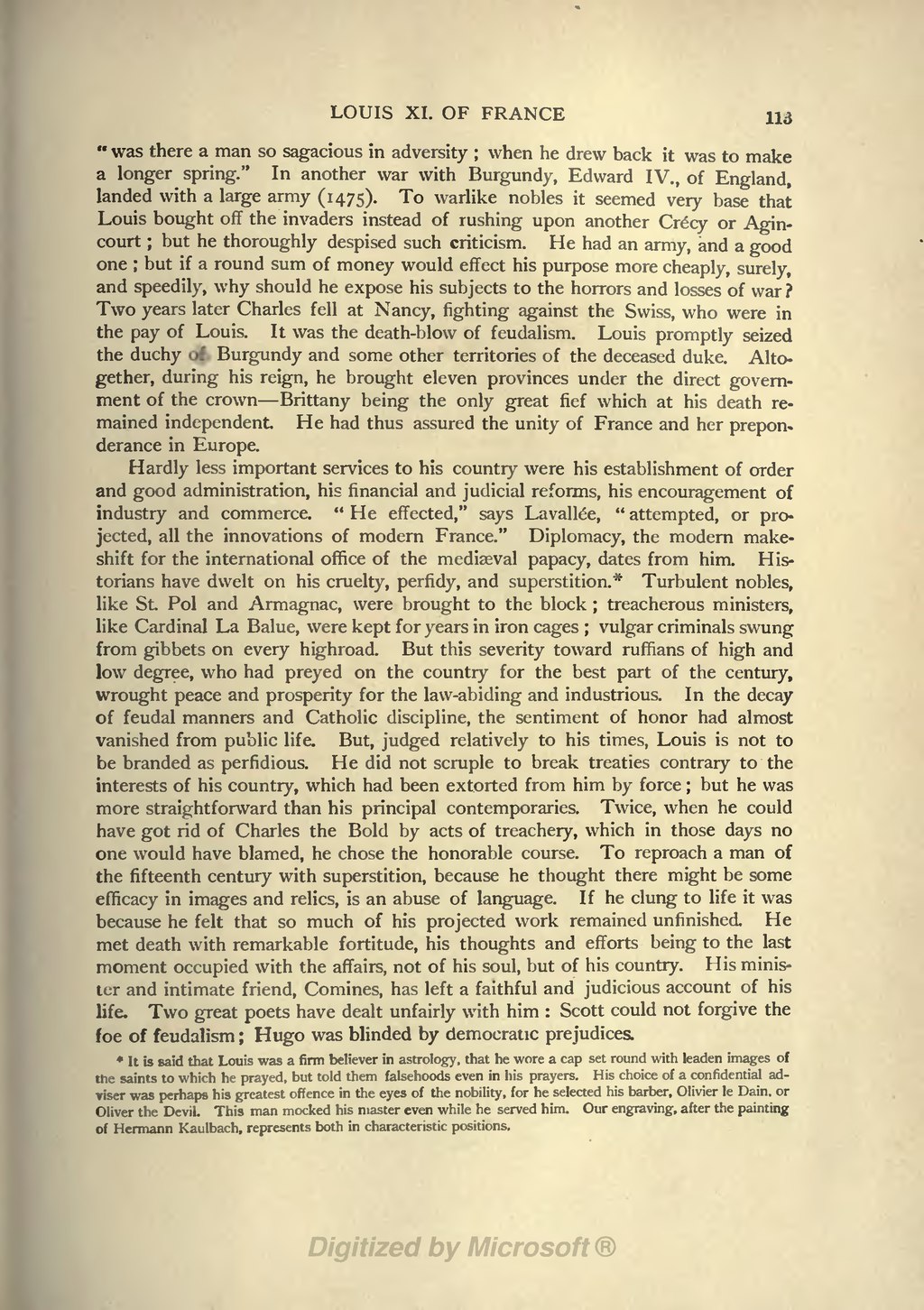LOUIS XL OF FRANCE 113 " was there a man so sagacious in adversity ; when he drew back it was to make a longer spring." In another war with Burgundy, Edward IV., of England, landed with a large army (1475). To warlike nobles it seemed very base that Louis bought off the invaders instead of rushing upon another Cre"cy or Agin- court ; but he thoroughly despised such criticism. He had an army, and a good one ; but if a round sum of money would effect his purpose more cheaply, surely, and speedily, why should he expose his subjects to the horrors and losses of war ? Two years later Charles fell at Nancy, fighting against the Swiss, who were in the pay of Louis. It was the death-blow of feudalism. Louis promptly seized the duchy of Burgundy and some other territories of the deceased duke. Alto- gether, during his reign, he brought eleven provinces under the direct govern- ment of the crown Brittany being the only great fief which at his death re- mained independent. He had thus assured the unity of France and her prepon. derance in Europe. Hardly less important services to his country were his establishment of order and good administration, his financial and judicial reforms, his encouragement of industry and commerce. " He effected," says Lavalle'e, " attempted, or pro- jected, all the innovations of modern France." Diplomacy, the modern make- shift for the international office of the mediaeval papacy, dates from him. His- torians have dwelt on his cruelty, perfidy, and superstition.* Turbulent nobles, like St. Pol and Armagnac, were brought to the block ; treacherous ministers, like Cardinal La Balue, were kept for years in iron cages ; vulgar criminals swung from gibbets on every highroad. But this severity toward ruffians of high and low degree, who had preyed on the country for the best part of the century, wrought peace and prosperity for the law-abiding and industrious. In the decay of feudal manners and Catholic discipline, the sentiment of honor had almost vanished from public life. But, judged relatively to his times, Louis is not to be branded as perfidious. He did not scruple to break treaties contrary to the interests of his country, which had been extorted from him by force ; but he was more straightforward than his principal contemporaries. Twice, when he could have got rid of Charles the Bold by acts of treachery, which in those days no one would have blamed, he chose the honorable course. To reproach a man of the fifteenth century with superstition, because he thought there might be some efficacy in images and relics, is an abuse of language. If he clung to life it was because he felt that so much of his projected work remained unfinished. He met death with remarkable fortitude, his thoughts and efforts being to the last moment occupied with the affairs, not of his soul, but of his country. His minis- ter and intimate friend, Comines, has left a faithful and judicious account of his life. Two great poets have dealt unfairly with him : Scott could not forgive the foe of feudalism ; Hugo was blinded by democratic prejudices.
- It is said that Louis was a firm believer in astrology, that he wore a cap set round with leaden images of
the saints to which he prayed, but told them falsehoods even in his prayers. His choice of a confidential ad- viser was perhaps his greatest offence in the eyes of the nobility, for he selected his barber, Olivier le Dain, or Oliver the Devil. This man mocked his master even while he served him. Our engraving, after the painting of Hermann Kaulbach, represents both in characteristic positions.
